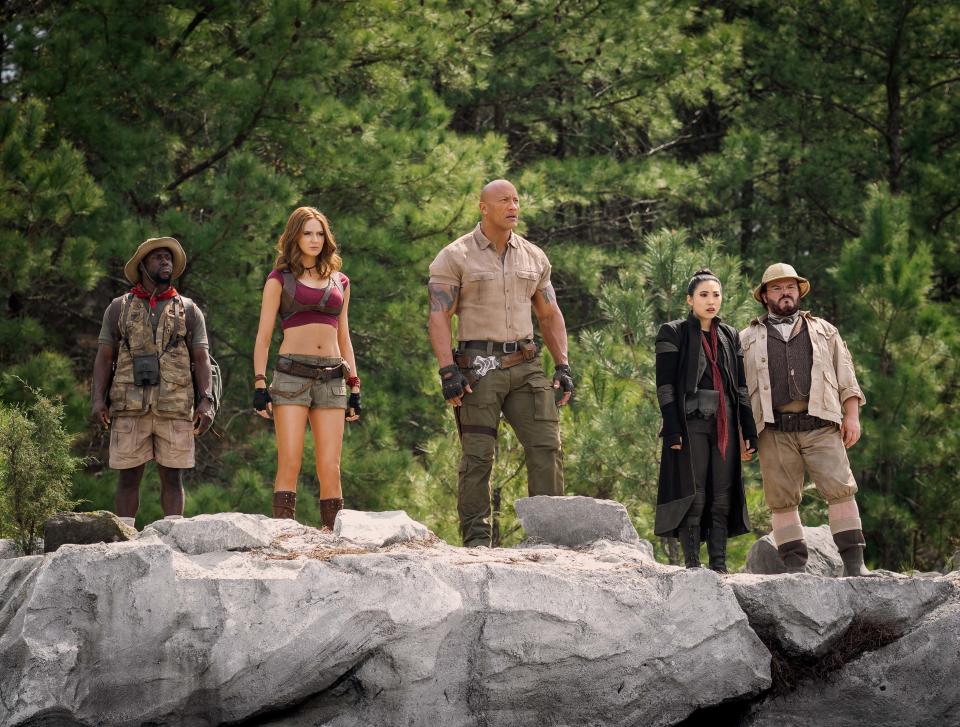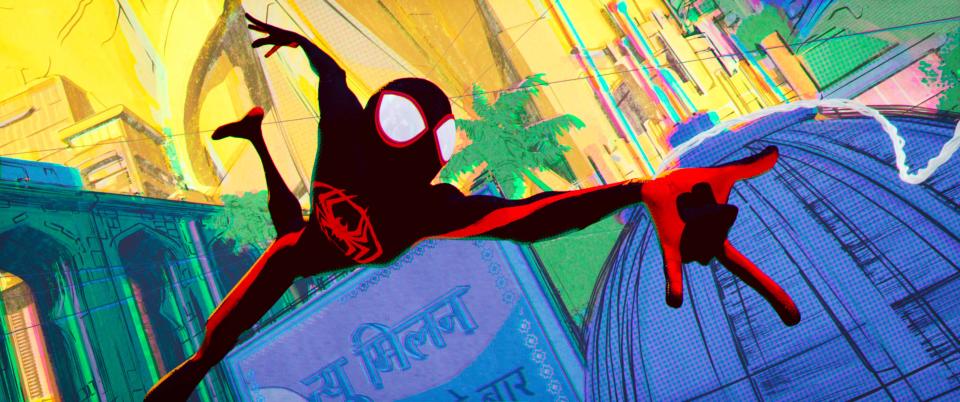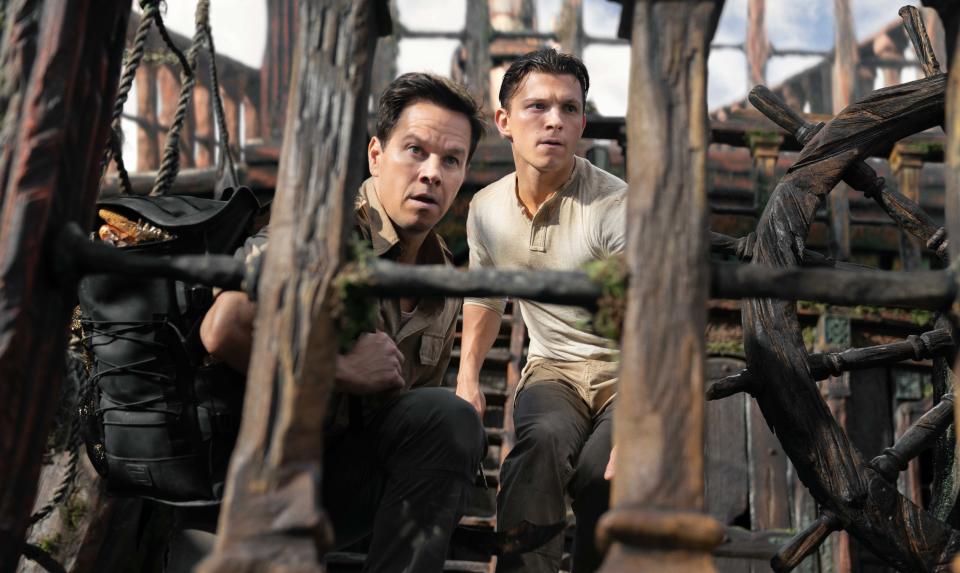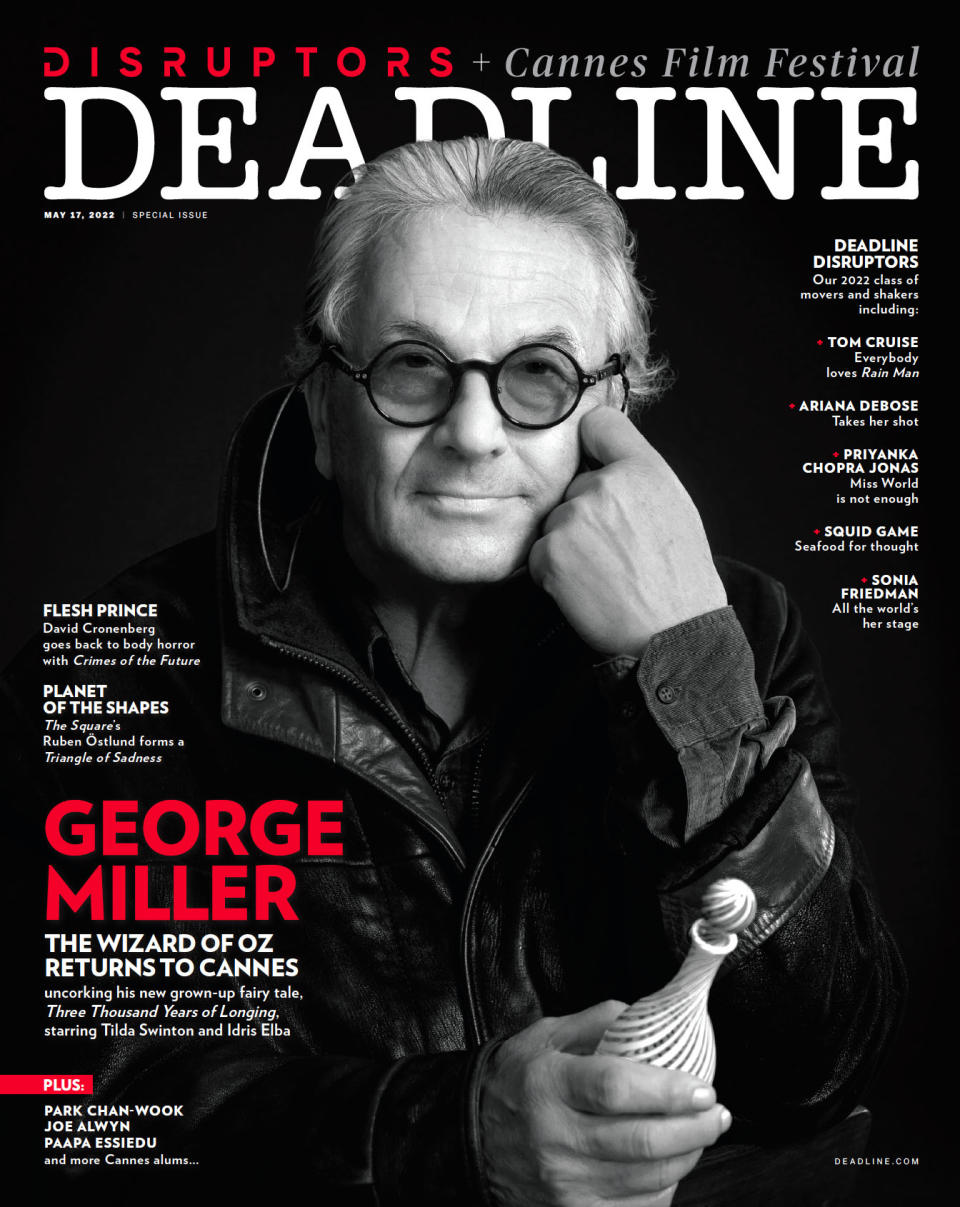Sony Chairman Tom Rothman Paddles Upstream To Keep Focus On Traditional Cinema — Deadline Disruptors
- Oops!Something went wrong.Please try again later.

From the time he stepped in as chairman of Sony’s Motion Picture Group in 2015, Tom Rothman has heard the rumors that Sony would eventually sell because it didn’t have a streaming service or the scale to compete with its behemoth rivals. Universal, Warner Bros., Disney and Paramount battle it out with him at the box office, but Rothman’s studio is the only one that hasn’t spent a fortune building a streaming arm that factors into the decisions he makes.

Still, Rothman is bullish on his studio’s chances, even before Netflix reports a 200,000-subscriber loss, prompting its stock to drop 35 percent and costing it $50 billion of its market cap.
More from Deadline
DEADLINE: You’re a Disruptor by being the only major studio head without the cushion of streaming service subscriptions, and you’re making it work. You’re a throwback to a model you used for decades at Fox, a studio that no longer exists.
TOM ROTHMAN: So, I’m the Last of the Mohicans?
DEADLINE: Why have other studios—and Wall Street—decided your model isn’t a good long-term strategy?
ROTHMAN: To paraphrase Mark Twain, reports of the death of the theatrical movie have been greatly exaggerated. Why it happened? There’s a current Wall Street obsession with streaming. The media narrative follows, and it becomes viewed as established wisdom whether or not it’s true. We finished the best year we’ve ever had at the movie company, in the midst of Covid. Our model is alive and well and thriving.

Columbia Pictures/Sony Pictures
DEADLINE: Why?
ROTHMAN: Cultural impact. If you are going to achieve any sense of permanence, of mattering in the movie content business, you have to make cultural impact. It’s different for series, but the vast forests of movie fodder that exist on the six or eight streaming services don’t make a cultural impact. The vast majority are written in disappearing ink. Because algorithms don’t market. [Streamers] don’t really have to get over the bar of making real cultural impact. Theatrical movies do. When they fail, it’s rough. When they succeed, they’ve become a meaningful part of pop culture and when that happens, they become very valuable economically. Sony Pictures alone has grossed $3.3 billion at the worldwide box office in those eight months, in the middle of Omicron. So, what do I say to those who say movies are dead? That’s a good death.
It wasn’t just Spider-Man; it was Ghostbusters and Venom and also Uncharted, a brand-new franchise for us. Ours is a fantastic model, when you win. The fact that we are one of the few companies that put that first gives us a great advantage with talent and filmmakers. We are not subservient to the larger corporate issues of a service and subscribers, and onto the next. We burn the boats on every movie. Quentin Tarantino said, ‘Rothman, yeah, he’s a butts-in-seats guy.’ I don’t know if my kids will like it on my tombstone, but I’ll take it. I’m a butts-in-seats guy. I am not knocking streaming; it’s been great for us. We’re an arms dealer to them and have made a lot of money doing it. We have great partnerships with them. But many filmmakers really value the audience connection experience in theaters, and they know we’re a company devoted to them. We’re going to make it work or die trying.
DEADLINE: You don’t subscribe to the narrative that movies are in trouble?
ROTHMAN: This is the thing the media underestimates. Real movies have competed with in-home entertainment since the ’50s. All the stories you read today about how movies are doomed, you could just have Xeroxed them from the New York Herald in 1958. That is when television came. Same with Home Box Office; same when VHS was invented. I hate to say it, I’m old enough to have lived through it all. Television turned out to be great for the movies. VHS turned out to be great for the movies. HBO came and everybody said, ‘You’re dead.’ It was great for the movies; the business made a fortune. Now it’s streaming. ‘You’re finished, pack it up.’ We ain’t finished. Streaming’s great. I have fantastic deals. Netflix has the first pay window and Disney the second pay window, and then that replicates with Sky and other providers all over the world. This pays us billions of dollars, when we make content that matters. Everything stems from that. Beyoncé was asked what’s the secret to everything in life? “Make dope shit,” she said. You just got to make cool shit.
DEADLINE: Beyoncé aside, your model makes you susceptible to slumps. That is not cushioned by the passive flow of streaming revenue. Isn’t that a potential Achilles heel to your model?
ROTHMAN: An Achilles heel? No. Is it a challenge to our model? Absolutely. But it has always been that way. I’ve done this now for decades; I’ve had hot hands and cold hands. Ultimately, you got to have more hot hands than cold hands, or you won’t last. I have a particular ethos I’ve followed and it’s not foolproof. I try to be creatively reckless and fiscally prudent, at the same time. Take creative risks and underpin them with financial downside protection. There are lots of ways to do that. Good use of partnerships at times and be sure that you’re aligned with the talent. You’re not giving away lots of the front end of the movie before you’ve recouped your cost. Take something like Once Upon a Time… in Hollywood. Well, that’s a creatively quite risky film, right? It was not inexpensive. So, we had partners, and the talent worked with us to be back-end driven. It worked out very well for all of us.
We just went through an Oscar race where some Best Picture contenders had runtimes of around three hours. Many streamer films clock in long. How much can you lean on filmmakers when, if a movie is 15 or 30 minutes shorter, you’ll get an extra theatrical run each day?
I never speak about it in that way. I speak about it in terms of the quality of the experience for the audience. If the film is less repetitive, more concise, more propulsive, the audience is going to enjoy it more. It’s going to be a better movie. I definitely agree with you that, overall, films have gotten too long. It’s ironic; I personally have worked on two of the three biggest films of all time. Titanic was three hours long, Avatar, two hours and 40-some minutes. And one of the top films ever, Avengers, was three hours. So, you have a bit of a tough time in the argument when they say, well, wait a minute, the biggest films of all time are long.
DEADLINE: What do you say?
ROTHMAN: It was right for those films. I sat in the first screening of Titanic. Nobody moved an inch.
DEADLINE: So, you look for people squirming in their seats?
ROTHMAN: Yes. When we screen a film now, and people start wandering… you don’t want the audience to get ahead of the storytelling, so don’t tell the audience what you already showed them. Get us one scene that dramatizes the idea really well, rather than two. This is part of my job, to speak truth to power, and sometimes power tells you to f*ck off. Mostly what I do is point to the audience. I actually don’t care how long the movie is. I care how long it feels.

Columbia Pictures/Sony Pictures
DEADLINE: It’s tempting for talent to make a streamer deal that brings a payday and a pre-determined back-end payday for a project that doesn’t have to be excoriated for box office performance. How do you sell a model of back-end participation after break-even, which involves a gamble?
ROTHMAN: I don’t have to sell it but if I wanted to, I’d just have to point them to any agent who represents anybody on Spider-Man. Ask them about the back end of that movie, and watch the smiles light up their faces. In terms of playing for the upside, there’s no comparison, if you have a hit. But you’re right that if you have a bomb, no. So, the first question is, what do you want? Do you believe in yourself? Are you willing to bet on yourself? I know this goes against the outsider’s perception of Hollywood, but I find that while talent rightfully cares about money, that’s not the prime motivation. They care more about their work and making something that matters and lasts. There are a lot of people who believe in the power of the experience of movies in theaters. Does that require some gambling and some leap of faith, and a risk of failure, when on streaming you can come and go and nobody will know? Yeah, it does. But who really remembers where they first were when they first streamed such and such a movie? Nobody. Do you remember where you first were when you first saw The Godfather? This is generational. I know where I first was when I first saw Lawrence of Arabia. And if you ask my daughters, they know where they first were when they first saw Moulin Rouge!.
DEADLINE: We have those memories but hasn’t social media and a pandemic created a youthful generation more fixated on TikTok, binge watching and other pursuits viewed from home?
ROTHMAN: I think that’s incumbent upon us to fix. For young people in particular, we have to make things that matter to them, the way music does and the way they’ve formed alliance to streaming series like Stranger Things and Euphoria. We have to make more like Get Out, Straight Outta Compton, Black Panther, the most recent Spider-Man. But don’t forget, teenagers still want to make out, and kids still want to get out of the house and away from their parents. Everything has been skewed by Covid. Everything. A mistake the media has made is to draw long-term conclusions from short-term circumstances. There was this New York Times article, a few weeks ago, that said, this is the end of movies. I would argue the exact opposite. I would say [the pandemic] proves the resilience of movies. That $3.3 billion figure I gave you, was achieved in the face of [adversity]. That’s resilience, not extinction. Covid literally closed our business, but here we are.
DEADLINE: You singled out media for scorn a couple times here. But I see studios shifting allegiances because they are wired to drive streaming services, and exhibitors that have never been on the same page as content generators. The Oscars would have been as forgettable as the one before, if Will Smith hadn’t slapped Chris Rock. Why doesn’t this industry do more to court those young people, instead of passively waiting for them to return?
ROTHMAN: Well, I agree with you. I think it’s imperative and a combined effort is needed. You mentioned the Academy. That was never particularly relevant to young people, but it was much more relevant culturally. Failings of the show aside, and we could talk about that forever, the Academy itself, and the pictures that it picks, has lost complete touch with the large audience. It’s become a self-defining elitist redoubt, and you’re just not going to be relevant if you’re that.

Columbia Pictures/Sony Pictures
DEADLINE: What can be done?
ROTHMAN: There’s a generational skip because family entertainment’s working well, and there are all these filmmakers making quality stuff for adults. So, what about the young person who just got their driver’s license? How do we excite them about going to the movies again? We on the filmmaking side, have to do a better job.
The $3.3 billion is impressive. When your Sony Corp. bosses in Japan look at this, are they satisfied? We keep hearing the film and TV components will have to be sold eventually, that there isn’t enough scale with the behemoths.
DEADLINE: What feedback are you getting from Japan?
ROTHMAN: We have terrific support from Tokyo. They’ve been very clear they are not sellers. They define the overall of Sony as an entertainment company with a solid foundation in technology. They have a case now where there’s a much greater synergistic inner working between the entertainment divisions, in Uncharted. That was a PlayStation property, then the movie company made it, and PlayStation helped us promote it to great success. That leads to more sales of games. Rather than lose billions and billions of dollars setting up a streaming business, we’ve used the arms dealer strategy, selling and making product for streamers. And we are enjoying record profitability right now.
DEADLINE: Long-term?
ROTHMAN: I believe there will come a time, not that far away, and I think you’re starting to see it, where Wall Street’s obsession with streaming and only counting subscribers is going to shift to, where’s the profit? As soon as Wall Street starts asking about streaming profit, as opposed to the billions of dollars that are getting poured into their war, then it’s going to be very favorable for Sony. It’s common belief that all seven or eight of these services can’t survive. Fortunately, we don’t have that risk. We have some good long-term deals that will benefit us for years to come. From everything that I can see, Tokyo’s had a very clear strategy that they’ve enacted with resolve, and it’s worked well.
DEADLINE: Studios with rival streaming services look at the origins of Netflix. They all licensed films to them, and now say, we created a monster. When you sell a movie like Greyhound to Apple, aren’t you perpetuating what you’re fighting to not be?
ROTHMAN: No. I think it’s very clear that there’s room in the ecosystem for both, and that the existence of streamers is very beneficial to us. In the same way that HBO and Showtime, and VHS, television and syndication poured hundreds of billions of dollars into the movie-making system. We’ve always competed with in-home. Is the competition harder now? Are they competing for product? Yes. If you can’t take the hit, get out of the game. Greyhound was a Covid-driven decision, but it was a very profitable one for us.
DEADLINE: The word was you got twice what it cost you to make it. But it was an important film for Apple, which has a sequel or two in the works.
ROTHMAN: I’m intensely proud of how we navigated Covid. Unlike many, we had no layoffs. Yes, there was product we had to license out when theaters were closed, but even then, we were really licensing first window. They revert to us, we retain China, we retain linear television and home entertainment. We licensed the first window because theaters were closed. Going forward, we will make some movies for streaming because that’s a viable ecosystem now.
DEADLINE: Those who doubted Sony’s strategy underestimated your franchise strength.
ROTHMAN: Uncharted, Jumanji, Spider-Man. We have our Marvel business, which breaks into three tranches. There are the Spider-Man movies, and we’re currently at work on two Spider-Verse sequels to our Oscar winning animated movie, with Lord and Miller. We hope to get working on the next Spider-Man movie.
DEADLINE: With Jon Watts, Tom Holland and Zendaya returning?
ROTHMAN: That whole group, we hope. Then there are movies I would call adjunct to the Spider-Man universe. That’s Kraven, which we’re shooting now, and Madam Web, which we’ll start in the spring with S.J. Clarkson directing. And then there are many Marvel characters that are standalone. When I took over Sony, it was said, oh, Sony has no IP. Not true. We actually had fantastic IP. We just needed to focus on it. We had Jumanji, Bad Boys, Uncharted. Ghostbusters, another example. Just before I got here, they took a turn down a road that didn’t work out that well. But because of Jason Reitman and his relationship with Ivan, may he rest in peace, we were able to resuscitate that into a tremendous success, both theatrically and in home entertainment.

DEADLINE: Will you do more Ghostbusters?
ROTHMAN: Yes, we will. We have plenty of franchise universes with which to operate in, but since I have Deadline here, I want to say, and please include this, OK? Everyone will say, yeah you did $3 billion but it’s all sequels and superheroes. It was not all that. There was Once Upon a Time… in Hollywood and Little Women. This summer, we’ve got Bullet Train, from David Leitch, with Brad Pitt, a pure original, R-rated rock ‘em, sock ‘em action movie for grownups. And Where the Crawdads Sing, a big bestseller with an up-and-coming actress, Daisy Edgar Jones, for women. I absolutely believe that women will come back to the box office.
DEADLINE: You mentioned Bad Boys. Reports had the brakes being pumped after Will Smith’s Oscar slap…
ROTHMAN: No. That was inaccurate. That movie’s been in development and still is. There weren’t any brakes to pump because the car wasn’t moving. That was a very unfortunate thing that happened, and I don’t think it’s really my place to comment, except to say that I’ve known Will Smith for many years, and I know him to be a good person. That was an example of a very good person having a very bad moment, in front of the world. I believe his apology and regret is genuine, and I believe in forgiveness and redemption.
Best of Deadline
New On Prime Video For March 2022: Daily Listings For Streaming TV, Movies & More
Fox Fall Premiere Dates: 'Masked Singer', '9-1-1', Animation Domination, Three New Series & More
Sign up for Deadline's Newsletter. For the latest news, follow us on Facebook, Twitter, and Instagram.

